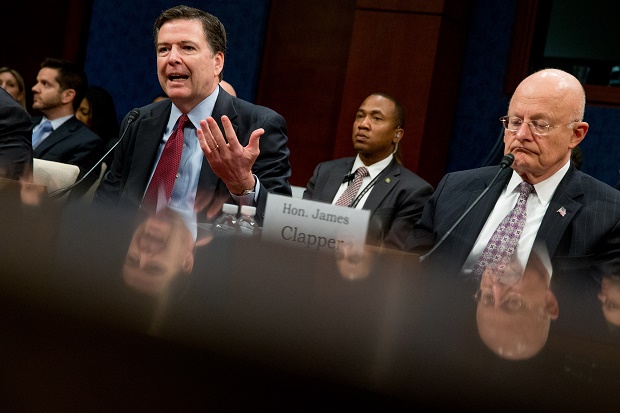CEO Tim Cook defends Apple’s resistance in FBI iPhone case

FBI Director James Comey, left, accompanied by Director of National Intelligence James Clapper, right, speaks at a House Intelligence Committee hearing on world wide threats on Capitol Hill in Washington, Thursday, Feb. 25, 2016. Comey says Apple had been “very cooperative” in the dispute and that there have been “plenty” of negotiations between the two sides. AP
CUPERTINO, California — Apple CEO Tim Cook got a standing ovation Friday at his first stockholder meeting since his company’s epic clash with the FBI unfolded. He defended the company’s unbending stance by saying: “These are the right things to do.”
On Thursday, the tech giant formally challenged a court order to help the FBI unlock an encrypted iPhone used by a murderous extremist in San Bernardino, California.
Federal officials have said they’re only asking for narrow assistance in bypassing some of the phone’s security features. But Apple contends the order would force it to write a software program that would make other iPhones vulnerable to hacking by authorities or criminals in the future.
Major tech companies are rallying to Apple’s cause, and now plan a joint “friend of the court” brief on its behalf. Facebook said it will join with Google, Twitter and Microsoft on a joint court filing. A Twitter spokeswoman confirmed that plan, but said that different companies and trade associations will likely file “multiple” briefs.
READ: Google will back Apple in court against the FBI
Apple filed court papers on Thursday that asked U.S. Magistrate Sheri Pym to reverse her order on the grounds that the government had no legal authority to force the company to weaken the security of its own products. The company accused the government of seeking “dangerous power” through the courts and of trampling on its constitutional rights.
The dispute raises broad issues of legal and social policy, with at least one poll showing 51 percent of Americans think Apple should cooperate by helping the government unlock the iPhone.
The FBI and other law-enforcement agencies insist they need to get into the phone in order to run down every lead in the San Bernardino shootings, which were at least partly inspired by the Islamic State extremist group. But skeptics have questioned whether this particular device — a work phone issued by one shooter’s employer — is likely to contain much useful information. Both assailants took care to destroy their personal phones prior to the massacre.
READ: Majority of Americans back FBI in battle with Apple
Some police officials acknowledge similar doubts. “If they went out of their way to destroy the other phones, there’s a pretty good chance there may not be anything of value,” said Jarrod Burguan, San Bernardino’s police chief. “This may be a whole lot of saber rattling and back and forth for nothing.” Burguan, however, believes police still have “a duty and a responsibility” to make sure there’s no useful evidence on the phone.
It’s unclear how the controversy might affect Apple’s business. Analysts at Piper Jaffray said a survey they commissioned last week found the controversy wasn’t hurting the way most Americans think about Apple or its products.
At least one shareholder at Friday’s meeting voiced support for the company’s stance.
“Apple is 100 percent correct in not providing or doing research to create software to break into it,” said Tom Rapko, an Apple investor from Santa Barbara, California, as he waited in line to enter the auditorium at Apple’s headquarters. “I think if you give the government an inch, they’ll take a yard.”
Cook offered only brief remarks about the FBI case, and most questions from shareholders concerned other aspects of Apple’s business. But the CEO won praise during the meeting from the Rev. Jesse Jackson and Cindy Cohn, executive director of the Internet rights group the Electronic Frontier Foundation.
“We applaud your leadership,” said Jackson, a longtime civil rights leader and former adviser to Martin Luther King, Jr. “I recall the FBI wiretapping Dr. King in the civil rights movement,” Jackson added. “We cannot go down this path again. Some of us do remember the days of (former FBI director J. Edgar) Hoover and McCarthy and Nixon and enemies lists.”
Apple’s share price has seen little change since the issue erupted in the news last week. Overall, though, the company’s stock has declined in recent months over worries that iPhone sales were slowing around the world.
A hearing on the iPhone legal dispute is scheduled for next month.
READ: Facebook’s Zuckerberg ‘sympathetic’ with Apple’s fight with US authorities